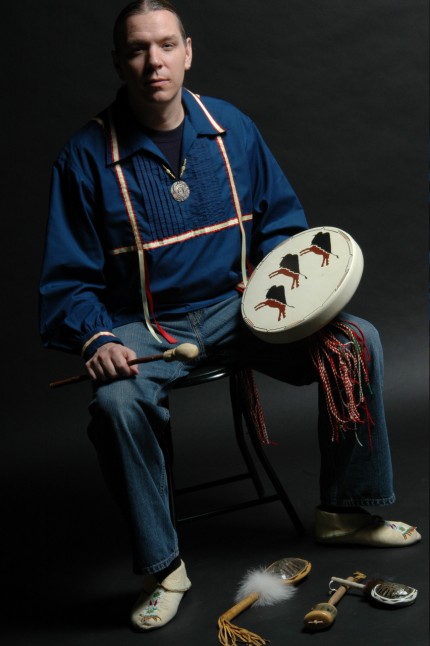The spiritual and environmental qualities of water are wide at Rockefeller Chapel concert

James Kallembach led the Rockefeller Chapel Choir and the Decani in a concert titled “Sacred Powers of Water,” as part of the chapel’s “Quire & Place” series. The concert, which took place Saturday evening at Rockefeller Chapel, was true to its title, and consisted of water-themed pieces, with the first half devoted exclusively to a cappella repertoire.
The high level of artistry at this concert was established by its opening work—Michael Tippett’s setting of the African-American spiritual “Deep River,” from his oratorio A Child of Our Time. Kallembach and the choir employed a large dynamic range, and the solo quartet delivered each cry of “Lord” with great urgency.
The second piece was the world premiere of Water on the Thirsty Land: Three Songs from the Book of Isaiah, a composition by Katherine Pukinskis, a graduate student at the University of Chicago. Though the basic sound-palette of the piece is quite accessible, surprising harmonic shifts abound, with a particularly unexpected one in the middle of the word “generations” in the third song.
The choir responded well to the opportunities afforded by the music. Pukinskis’s suspension-filled textures are the kind that expose any flaws in tuning, but the choir’s tone was clear and pure. They produced an otherworldly sound as they intoned “you are mine” in the first song, and they ended the piece with a rich, dark hue for the resonant low chord on the concluding word “continually.”
In Henryk Górecki’s Szeroka Woda (Broad Waters), a setting of five Polish folk poems celebrate the rivers of that country. Here Kallembach and the choir got to display some colors that had not been shown yet in the other works. In the second song, “Oj, kiedy na Powislu,” the singers transformed their voices into percussion instruments for its pulsing backdrop. And in the concluding movement, “Szeroka Woda,” they showed that they could sustain a loud, full-throated sound without becoming strident. This made the delicate and slow reprise that followed all the more effective.
After the previous works offered such a wide dynamic range, the smaller-scaled performance of Aaron Copland’s In the Beginning was an apt contrast. Copland’s setting of the Creation from the King James Bible eschews the sort of text painting Haydn employs in his famous oratorio: there is no explosion of sound when God creates light, no depictions of the individual creatures. Instead, the dramatic arc is projected through the individual character of each day.
Kallembach and the choir distinguished these well, particularly in the imitative counterpoint of the second day, and in the typically Copland-esque syncopations of the fourth day, which they rendered with the necessary rhythmic snap. The part for solo mezzo-soprano can be unrewarding, consisting of emotionless narrative declamation, but Lindsey Adams’ warm, focused timbre made the role a pleasure, with every pitch natural and dead-on.
After the very strong first half, some of the programming choices after intermission felt odd. A performance of James Erb’s familiar arrangement of the traditional melody “Shenandoah” was followed by a transcription for solo organ of Delius’s Aquarelle. Perhaps it was a product of the transcription, but Thomas Weisflog’s performance felt choppy, rather than flowing and impressionistic, like the original. The piece also abandoned the focus on the spiritual dimensions of water, which the rest of the program maintained.
After the organ solo, Christopher Neill—director of the Ecosystems Center at the university’s Marine Biological Laboratory—ascended to the lectern to give an impassioned environmentalist sermon on the destruction of our coastal marshlands, the Arctic sea, and the flying rivers of the Amazon basin. While timely relative to world events, this speech’s appearance in the middle of the concert, felt preachy and jarring, and made an ill-suited introduction to the world premiere that followed.
Oka’ Aya’sha’ (The Water Place) by Jerod Impichchaachaaha’ Tate, a Chickasaw composer, draws upon musical material from his nation’s “Gar Fish Dance” and “Raccoon Dance” songs. For this work, the choir was accompanied by an orchestra consisting of ten woodwinds and two percussionists.
Whereas most of the pieces on the program rapidly shifted moods, Tate’s work operates in an entirely different aesthetic. His piece is composed of extended blocks of sound, with the choir often chanting long stretches of text on the same tone. The infrequent shifts in mood arrive as major events, and are mostly catalyzed by the orchestra, instead of the choir, evoking water through swirling woodwind figures and thundering timpani. It is the kind of piece that conjures sonic spaces to inhabit, rather than moments to cling to, and as such it was well-suited to the environment of Rockefeller Chapel.
A version of this program will be repeated in September, at the Marine Biological Laboratory in Woods, Massachusetts.
Posted in Performances


